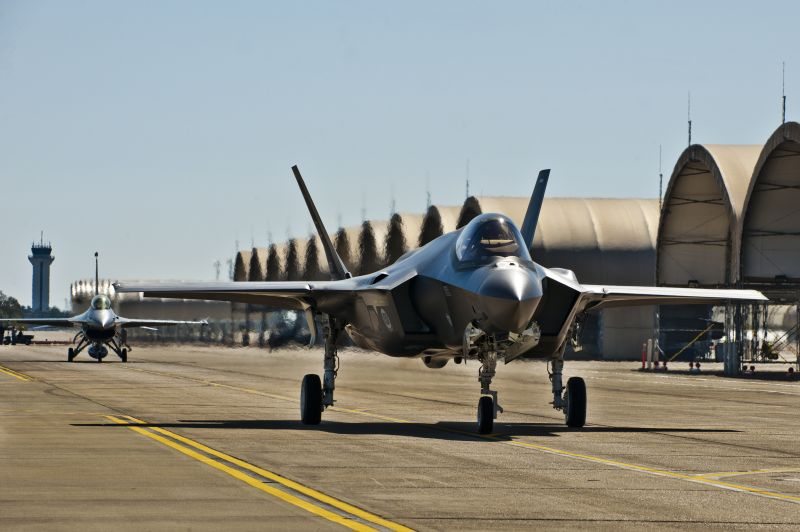The launch of the first F-35 Lightning II flight here March 6 is a small step into the next half century of air dominance.
Morale was high even though the sortie was abbreviated by the pilot’s determination of “in flight emergency.”
“Our first sortie is truly a milestone for the program,” said Col. Andrew Toth, 33rd Fighter Wing commander. “Unfortunately things happen. We didn’t want it to happen today but we were prepared. Our pilot did the exact right thing in returning the jet back to Eglin. Although there were issues we are doing whatever we can to move the program forward safely and effectively.”
Pilots and maintainers will meet later today to discuss the potential fuel leak finding that caused the precautionary end of the sortie at 15 minutes versus the 90 minutes scheduled to be airborne to complete the operational check flight.
“We met both objectives today: get the aircraft airborne and start local area operations,” said Lt. Col. Eric Smith, the Air Force’s first F-35 pilot who tested the aircraft at Edwards AFB, Calif. “Our team did the most conservative thing by deciding to bring the plane back. We trained for this many times in the simulator for this exact reason.”
The crowd on the flight line present for take-off kept the cheers for their integrated team’s first aircraft launch and feel the day was still a success.
“It’s a wonderful experience to know I made history launching the first F-35,” said Staff Sgt. Jeremy Hauser, 33rd Aircraft Maintenance Squadron, who saluted Smith in the cockpit before the jet taxied down the ramp.
Maintainers have been preparing for today’s launch with engine runs and taxi operations for approximately eight months since the aircraft began arriving here last summer. Utilizing virtual trainers, developing pilot curriculum and hosting small group tryouts has been the focus of personnel to ready themselves for flight operations to come.
“This is our execution year,” said Toth, who is proud of his team for laying the foundation to get the nation’s training program ready to go. “The cohesion we developed between the services makes this not just about the Air Force but about the wing’s program to launch the F-35A as a baseline for the JSF program’s future. It’s taken the entire team, all services and contractors to build this up. Had the partnership not been there, I don’t think we’d be here today.”
Since 2009, Air Force, Navy and Marines sent their best aviators and aircraft mechanics to develop the next generation warriors of the joint strike fighter program here.
“I can’t wait until we fly more and show our stuff to the world,” said Senior Airman Arthur Verchot, 33rd Aircraft Maintenance Squadron crew chief launch assistant.
More pilot students will flow into the program at the right time so the wing has the correct number of people in each phase of the program. With people as the main training product, the 33 FW focuses on preparing for an anticipated 2,200 students a year and 900 “on campus” at any given time at full capacity.
According to Air Education and Training Command, they are taking an event-driven approach to assess when to begin transitioning the entire JSF training system, including the aircraft, to a point where the wing can initiate the training syllabus.
“We will continue to make steady progress towards our goal of standing up a world class training program at Eglin,” said Gen. Edward Rice Jr., commander of AETC, who approved F-35 flight operations to begin shortly after the Air Force Aeronautical Systems Center awarded an airworthiness certificate to the service for their variant of the joint strike fighter.










